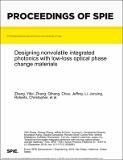Designing nonvolatile integrated photonics with low-loss optical phase change materials
Author(s)
Zhang, Yifei; Zhang, Qihang; Chou, Jeffrey B.; Li, Junying; Roberts, Christopher; Kang, Myungkoo; Gonçalves, Claudia; Soref, Richard; Ríos, Carlos; Shalaginov, Mikhail; Richardson, Kathleen; Gu, Tian; Liberman, Vladimir; Hu, Juejun; ... Show more Show less
DownloadPublished version (727.6Kb)
Publisher Policy
Publisher Policy
Article is made available in accordance with the publisher's policy and may be subject to US copyright law. Please refer to the publisher's site for terms of use.
Terms of use
Metadata
Show full item recordAbstract
The development of low-loss optical phase change materials (O-PCMs) promises to enable a plethora of nonvolatile integrated photonic applications. However, the relatively large optical constants change between different states of calls for a set of new design rationales. Here we report a non-perturbative design that enables low-loss device operation beyond the traditional figure-of-merit limit. The basic design rationale is to engineer the light propagation path through the OPCMs when it is in the low-loss amorphous state, and divert light away from the lossy crystalline state leveraging the large mode modification induced by the O-PCM phase transition. Following this approach, we demonstrate broadband photonic switches with significantly enhanced performances compared to current state-of-the-art.
Date issued
2019-09Department
Massachusetts Institute of Technology. Department of Materials Science and Engineering; Lincoln LaboratoryJournal
Proceedings of SPIE - The International Society for Optical Engineering
Publisher
SPIE
Citation
Zhang, Yifei et al. "Desigining nonvolatile integrated photonics with low-loss optical phase change materials." Proceedings of SPIE - The International Society for Optical Engineering, September 2019, San Diego, California, The International Society for Optical Engineering, 2019, DOI: 10.1117/12.2528993 © 2019 SPIE.
Version: Final published version
ISBN
9781510628557
9781510628564
ISSN
0277-786X